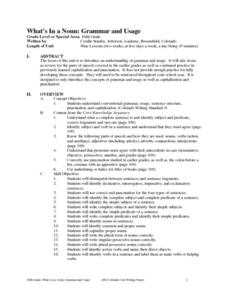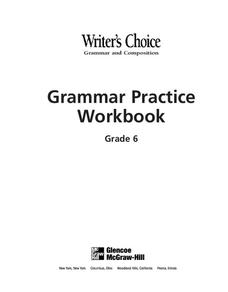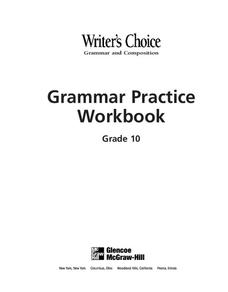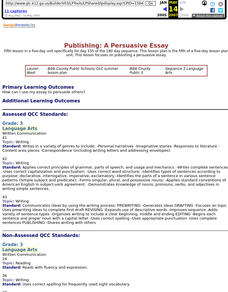ClearVue
Perfect Punctuation
Using the provided "[Punctuation] Rules to Remember" young grammarians punctuate clauses, phrases, participles, and quotations in a series of worksheets.
Curated OER
What's In a Noun: Grammar and Usage
Nine lessons in a grammar and usage unit provide endless opportunities for drill and practice. Topics include the four types of sentences, subject and predicates, nouns, verbs, adjectives, pronouns, adverbs and prepositions, conjunctions...
Curated OER
Punctuation 2: Other than Commas
Thoroughly cover the nuances of apostrophes, quotation marks, dashes, hyphens, colons, and semi-colons. Intended for higher-level English classes, the examples given pertain to tricky rules and formal language. There are no animations or...
Curated OER
Apostrophe Usage
Helpful as a review activity and a reference sheet for your middle schoolers' binders, this worksheet clarifies the proper ways to use apostrophes. Indicating that they should be used in three cases ("weird" plurals, contractions, and...
McGraw Hill
Grammar Practice Workbook
To an English teacher, the only sound worse than nails on a chalkboard is a student using improper grammar. Make poor grammar a problem of the past with this extensive collection of worksheets that covers everything from sentence...
McGraw Hill
Grammar Practice Workbook
Make sure your pupils exercise their grammar muscles with this collection of worksheets. Organized into units, the packet covers everything from the parts of speech to sentence structure to punctuation.
Curated OER
Apostrophe Function and Punctuation
In this apostrophe use instructional activity, students read the two primary functions of apostrophes: to show possession and to show the omission of letters. They complete 24 examples in which they apply the rules for both uses.
Curated OER
Apostrophes Used in Contractions and Possessions
In this writing worksheet, pupils read about the proper use of apostrophes in possessives and contractions. They decide if 10 statements are written correctly and correct any errors that they find.
Curated OER
Parts of a Friendly Letter
The art of writing a letter has not been lost to email and texting! Teach kids how to format a friendly letter with a presentation about the parts of a letter, as well as prompting them to write a letter about their favorite holiday.
Curated OER
PICTURE READING - PARAGRAPH WRITING
Students investigate the elements found in a media image. The image is used to compose a descriptive paragraph. They exchange papers to discuss the writing and make changes using constructive criticism. Students also make connections...
Curated OER
Roll Out the Run-ons
Learners participate in activities in order to investigate the concept of run-on sentences. They identify a complete sentence and the correct characteristics that it possesses.
Curated OER
Daily Oral Language Activities in the Classroom
Daily Oral Language is a great way for you and your students to begin the day.
Curated OER
Grammar Puzzles
Students explore the parts of a sentence through analysis, design, and drawing in this nine lessons unit on Grammar. The diagramming of sentences comprises the main thrust of this unit through the utilization of higher cognitive skill...
Curated OER
Publishing: A Persuasive Essay
Third graders are given an opportunity to create a visual to accompany their presentations of their persuasive essays. They may use the computer or other media as resources.
Curated OER
Wacky Web Tales
Students study the parts of speech and then review them. They identify each part of speech and place them on a tree map. Then they visit a website to create a "Wacky Web Tale" using information from the tree map. They print their tales...
















